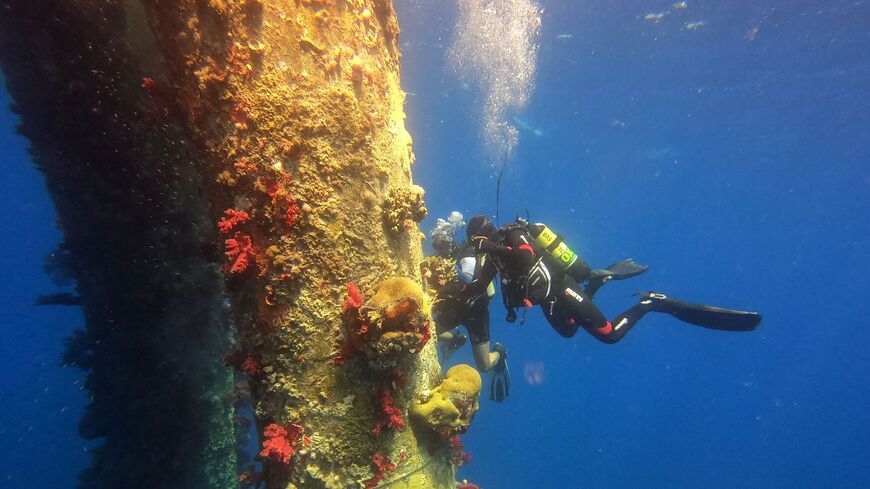Israel's Finance Ministry reached an agreement with an Israel state-owned energy company to construct a multi-optic-fiber between Ashkelon and Eilat, with the goal of turning the country into an international communication corridor.

An Israeli Nature and Parks Authority employee dives in the Red Sea to remove corals that grew on columns supporting the Europe Asia Pipeline crude oil jetty off the shore of Eilat in southern Israel on May 21, 2019, ahead of maintenance works at the site. - MENAHEM KAHANA/AFP via Getty Images
Israel’s Finance Ministry said Monday the country plans to construct a multi-optic-fiber cable that would stretch on land between the city of Ashkelon, on the shores of the Mediterranean Sea, all the way to the southern city of Eilat, on the shores of the Red Sea, turning Israel into a fast-communication regional hub.
According to the announcement, the Israel state-owned energy company Europe-Asia-Pipeline-Co (EAPC) will build the 254-kilometer (157-mile) optic fiber on an already-existing infrastructure of oil pipelines it operates. In addition, EAPC will construct two connection stations — one in Ashkelon and one in Eilat. The idea is that the Ashkelon connection station will link Israel to Europe, and the Eilat connection station will link Israel to Gulf countries and Asia. On the Eilat side, there is also intention to link the fiber to Jordan via the coastal city of Aqaba.
The EAPC has been transporting crude oil between Ashkelon and Eilat since the 1960s. With its three pipelines, it is capable of transporting crude oil in both directions. In 2020, fearing significant damage to the Eilat coral reef, Israel’s Environment Ministry blocked a project between the EAPC and UAE-based MED-RED to enhance the use of the Ashkelon-Eilat pipelines, in order to link the country with Gulf countries. The East-Med natural gas pipeline project and the new initiative for an undersea electricity cable are also expected to be installed from Ashkelon.
Israel’s Finance Ministry has been negotiating the optic-fiber project with the EAPC for several months. Last year, the ministry halted the project after the EAPC and the state-owned water company Mkorot demanded authorization to install working optic fibers. The two companies were planning to rent out or lease the use of these already-operating cables to private communication/internet companies. The Finance Ministry refused, explaining that state-owned companies should not compete against private companies or take over sectors of the private market.
Monday’s deal was reached after the EAPC agreed to install a "dark" (unlit) multi-optic fiber instead of "lit" fibers. This means that companies will rent "dormant" fiber cables and operate them themselves. According to the deal, any Israel-licensed company will be authorized to lease fiber segments for a period of 25 years, to begin with, and thus will not need to construct an optic-fiber network of its own. In parallel, the EAPC will use the cable to monitor the original oil pipeline infrastructure for signals of problems such as ruptures or break-ins.
The EAPC told the Israeli daily Calcalist that constructing a land fiber would make it easy to secure and operate. The project, it said, is expected to advance commercial and technological cooperation between Israeli companies and other companies worldwide, especially in the Abraham Accords countries (Emirates, Bahrain, Morocco and Sudan). The plan approved by the Finance Ministry and the EAPC includes the use of the most advanced optic-fiber technologies used by global companies, turning Israel into an international communication corridor.
Related Topics
Join hundreds of Middle East professionals with Al-Monitor PRO.
Business and policy professionals use PRO to monitor the regional economy and improve their reports, memos and presentations. Try it for free and cancel anytime.

Already a Member? Sign in
Free
The Middle East's Best Newsletters
Join over 50,000 readers who access our journalists dedicated newsletters, covering the top political, security, business and tech issues across the region each week.
Delivered straight to your inbox.
Free
What's included:
Our Expertise
Free newsletters available:
- The Takeaway & Week in Review
- Middle East Minute (AM)
- Daily Briefing (PM)
- Business & Tech Briefing
- Security Briefing
- Gulf Briefing
- Israel Briefing
- Palestine Briefing
- Turkey Briefing
- Iraq Briefing
Expert
Premium Membership
Join the Middle East's most notable experts for premium memos, trend reports, live video Q&A, and intimate in-person events, each detailing exclusive insights on business and geopolitical trends shaping the region.
$25.00 / month
billed annually
What's included:
Our Expertise AI-driven
Memos - premium analytical writing: actionable insights on markets and geopolitics.
Live Video Q&A - Hear from our top journalists and regional experts.
Special Events - Intimate in-person events with business & political VIPs.
Trend Reports - Deep dive analysis on market updates.
All premium Industry Newsletters - Monitor the Middle East's most important industries. Prioritize your target industries for weekly review:
- Capital Markets & Private Equity
- Venture Capital & Startups
- Green Energy
- Supply Chain
- Sustainable Development
- Leading Edge Technology
- Oil & Gas
- Real Estate & Construction
- Banking
Already a Member? Sign in



Start your PRO membership today.
Join the Middle East's top business and policy professionals to access exclusive PRO insights today.



